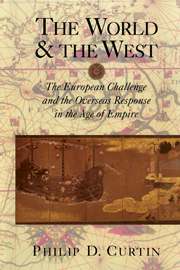Book contents
- Frontmatter
- Contents
- Preface
- Part One Conquest
- Part Two Culture Change and Imperial Rule
- Part Three Conversion
- Part Four Independence and the Liquidation of Empires
- 11 Non-European Resistance and the European Withdrawal
- 12 Personal and Utopian Responses
- 13 The Search for Viable Independence: Indonesia
- 14 Paths to Viable Independence: Ghana
- Afterword
- Index
12 - Personal and Utopian Responses
Published online by Cambridge University Press: 05 June 2012
- Frontmatter
- Contents
- Preface
- Part One Conquest
- Part Two Culture Change and Imperial Rule
- Part Three Conversion
- Part Four Independence and the Liquidation of Empires
- 11 Non-European Resistance and the European Withdrawal
- 12 Personal and Utopian Responses
- 13 The Search for Viable Independence: Indonesia
- 14 Paths to Viable Independence: Ghana
- Afterword
- Index
Summary
Some reactions to the Western presence took overt and organized political form, but many of the most significant responses had little to do with politics. Some social and intellectual leaders in the non-West consciously considered the Western phenomenon and publicly outlined a program to deal with it. Other reactions were as personal and informal as the choice in the style of clothing or the language of public expression. In any case, the reaction to the Western presence was rarely a bipolar choice between local tradition on one hand and the West on the other. There was always room for innovation that would provide a number of alternatives.
A rich literature already deals with choices made by articulate non-Western leaders. Aside even from their own writings, biographers have dealt with figures such as Gandhi, Nehru, and similar outstanding people in other societies. Anthropologists and historians have also investigated the less documented responses of the less articulate, such as peasant intellectuals who sought to understand and to respond to conditions they confronted in a changing world.
Another, less common, approach, is the study of personal reactions to the Western impact through group biography. Leo Spitzer's Lives in Between has dealt comparatively with the permutations of race, religion, and class in culturally mixed societies. He traced three families through a number of generations in different parts of the world. One was the Sierra Leonean May family, descendants of slaves captured at sea and landed there by the British Navy in the early 1800s.
- Type
- Chapter
- Information
- The World and the WestThe European Challenge and the Overseas Response in the Age of Empire, pp. 213 - 231Publisher: Cambridge University PressPrint publication year: 2000



